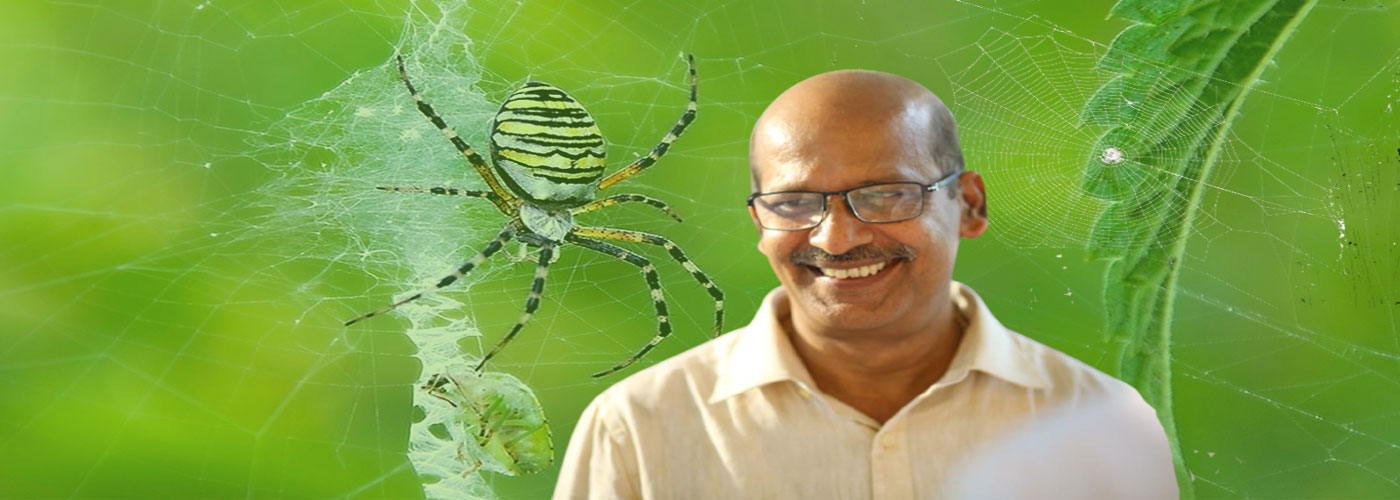
P. A. Sebastian, the eminent Indian arachnologist, ecologist and conservationist, passed away due to heart failure on 13 January 2021. Indeed, he was one of the leading experts in India, who had sound knowledge on the taxonomy and biology of spiders.
Dr Sebastian hailed from North Veliyanad, a remote village in Kuttanadu, famous for its green paddy fields in the Alappuzha district of Kerala, South India. He moved out of Kuttanadu at the age of 21 to pursue higher studies and his passion for nature. Getting what he called a ‘precocious start’, Sebastian became a college freshman at the age of 21, receiving a B.Sc. degree at 24, M.Sc. at 27 and Ph.D. at 33.
After graduating from the University of Kerala in 1979, he moved to Belgium for a year to pursue a diploma in French. In 1983, he completed his M.Sc. in zoology from the University of Rajasthan. Then he moved to Bhavnagar University, Gujarat, for a Ph.D. under B. H. Patel. He graduated in 1989, studying the biology of some predaceous spiders on insect pests of major crops in north Gujarat.
He was appointed Assistant Professor of Sacred Heart College, Thevara, Kochi in the Department of Zoology. Sebastian began his work with a PhD in 1983 and turned a small lab at home to what is now the facility at Sacred Heart College. He became Director, Division of Arachnology (founder of this Division) in 2013, and served in that capacity until his demise. This is one of the leading centres in India where extensive research on spiders is on-going in a systematic and scientific manner, similar to the Zoological Survey of India.
The Division of Arachnology was established in 1998 and has since emerged as an acclaimed centre for research in taxonomy and bioecology of spiders. The Arachnology Division of PG and Research Department of Zoology (DST FIST-sponsored), Thevara, has all the basic infrastructural facilities for successful implementation of any project on spiders. Identifying and cataloguing the spider diversity of South India, particularly Kerala, has been the primary motive of the Division since its inception. Sebastian’s efforts have led to an impressive collection of spider specimens in the museum, which serves as a reference for spider enthusiasts across thecountry. The Division has developed modern facilities, multipronged strategies and technological capabilities to achieve its objectives related to identification, cataloguing, creating a repository of available spider fauna and database management.
Dr Sebastian was a prolific scientist, publishing more than 100 articles in reputed journals, including two books and many book chapters over the course of his career. His early works include the influential book Spiders of India. This book was intended to popularize the study of spiders in India, correct many false impressions about these insects, create awareness and interest about their study and, more importantly, to provide an in-depth understanding with detailed information on selected species. It was an authentic book on Indian spiders after a gap of 40 years from the Indian subcontinent. Sebastian has several seminar papers to his credit on the biology of spiders, endemism, species concepts, spider diversity of the Western Ghats, synanthropic spiders, spinneret morphology.
His prodigious contributions have added 2 new genera and more than 50 new species of spiders to the world spider catalogue. In addition to his role as a teacher, Director and Chairman or Councilor of numerous scientific societies, Sebastian served on several editorial boards and scientific panels, leaving a rich legacy in conservation education. He advised over 25 students both for doctoral studies and research projects, many of whom now have illustrious careers in arachnology and systematics around the world.
Dr Sebastian also delivered many scientific lectures on different aspects of spiders, including topics like ‘spider silk biotechnology and applications of spider venom’ in India and abroad. To share research findings with arachnologists the world over, as well as with the general public, the Division has launched the website – southindianspiders.org – the first of its kind in India.
Keenly aware of the threats regarding biodiversity, Sebastian was actively involved in initiatives to address the ‘taxonomic impediment’ by accelerating the pace of species discovery and description, including programmes such as workshops on spider taxonomy, spider identification and spider collection techniques. He received grants, both major and minor, for implementing automated methods of species.
Sebastian is survived by his wife Elizabeth Chacko (currently Deputy Director, Department of Agriculture, Thiruvananthapuram) and three children. His eldest daughter, Roshni Mary Sebastian, is a postdoctoral fellow studying sustainable waste management at the University of Alberta, Canada.
